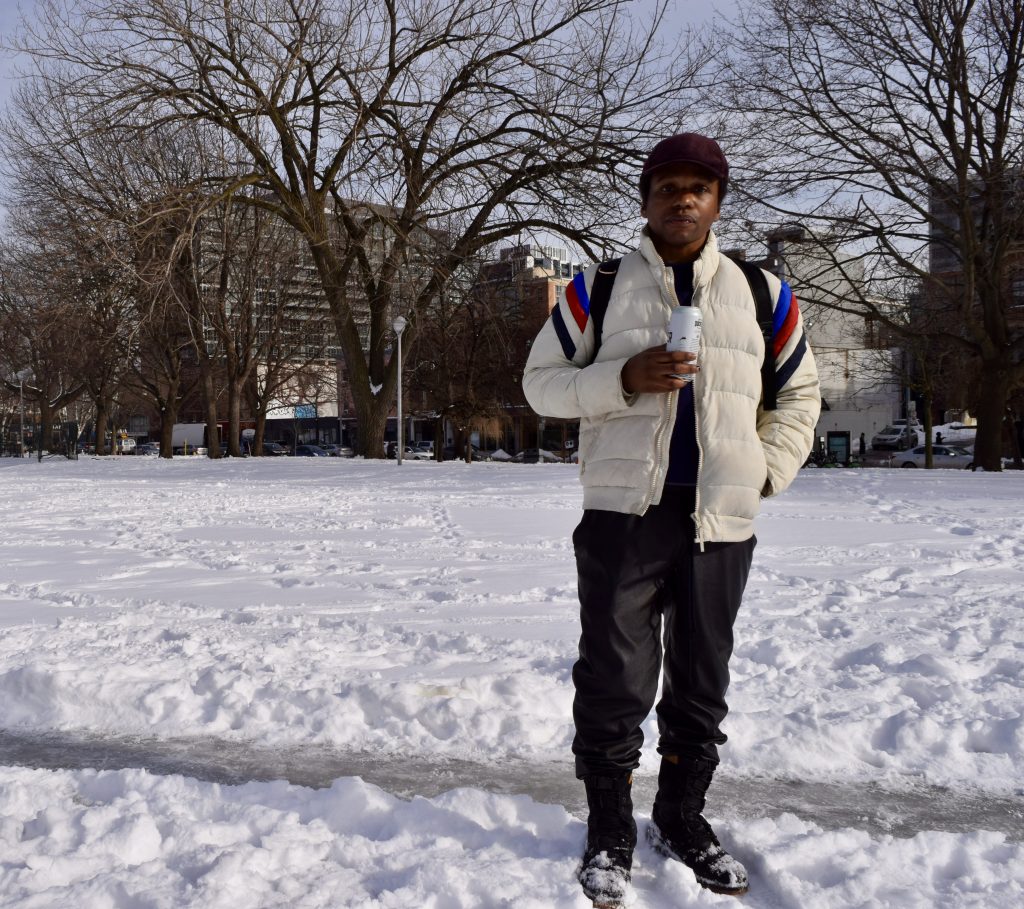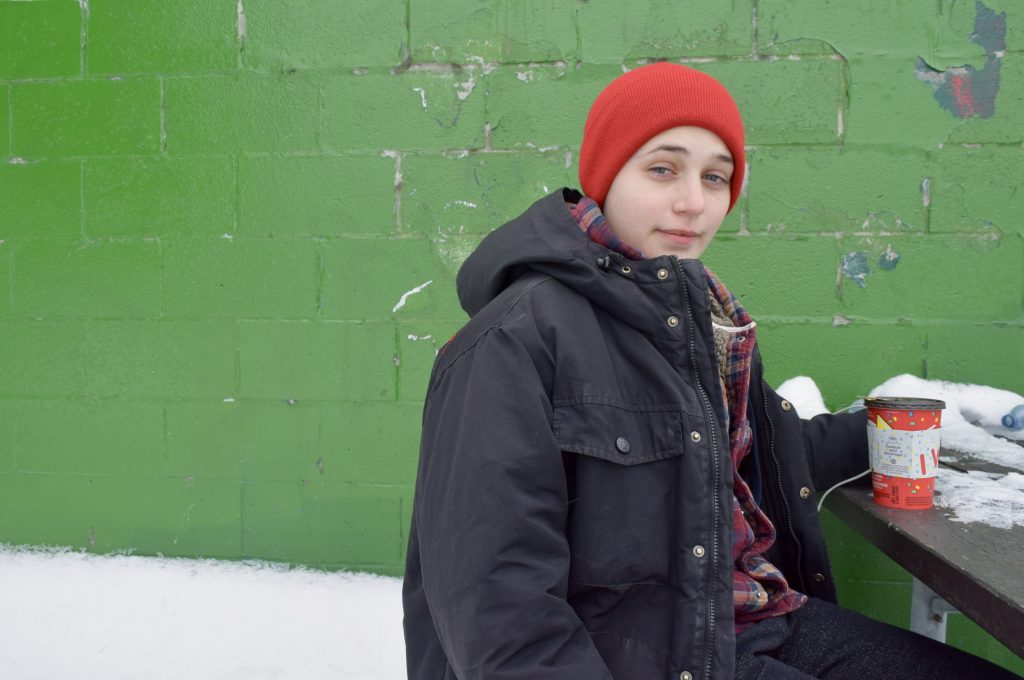By Kiernan Green
Members of Moss Park’s harm reduction community share the stories of who they’ve lost, and the day they made their loss known to Toronto City Hall.
They marched on Dec. 11, 2017, greeted only by the sharp wind of a winter without snow.
About 150 people gathered that morning in Moss Park. They had a message for people starting their work day in Toronto’s City Hall. They set down Queen Street to deliver it, carrying placards, tombstones, and roses. They marched in silence, letting the memories of lost loved ones speak for themselves. At the front, they held their banner which told the world “We Grieve Thousands.”
Compassion doesn’t know who is or isn’t deserving of it. Compassion only knows the effort put in – and how difficult that effort is when there hasn’t been effort before. During the “We Grieve Thousands” march, Toronto’s harm reduction community demanded that effort for compassion be made in the wake of an opioid crisis.
Akia Munga walks through the alley behind Moss Park’s Overdose Prevention Site, towards the park of the same name on Queen Street. The park where the march had begun over a year ago. They nudge a used needle into a sewer grate, as simply as kicking at a pebble. Drug use is a part of Akia’s life. As much a part of it as the earlier months of their 27 years, with warm days spent in the tight, excited streets of Kensington Market in the early 2000s. Them, their friend Phoenix, and David, the “bright-eyed street boy” who would become Akia’s
Akia has lost 25 friends in the last two years. “They’re always circulating in there. They sit with me all of the time.”

Akia and Olympia Lynn Trypis, 23, had once lived together at Eva’s youth harm reduction shelter in North York, where they both became peer support workers. Years later, Olympia was at their elbow holding their banner at the front of the “We Grieve Thousands” march. Akia says it as if that fact is obvious, and it’s the most beautiful fact in the world. “Oh, I love Olympia so much,” says Akia, as if the light in their eyes hadn’t said it for them. They consider Olympia a sister.
Olympia says she and Akia were inspired by the “protests of the opioid crisis” happening across North America. She’s lost someone who she had come to consider a father. She had met Kevin Romans in Moss Park while looking to pick up heroin. “I trusted him, and he helped me,” she says. He gave her a place to stay for three years in his two-bedroom apartment, sleeping on the floor until he bought her a bed.
“All he wanted to do was help people and offer his space and love. He’s a very loved man and
People protect her within her community. They build devoted relationships. “And they die. You [think] ‘what happened? Was it my fault? Should I have done something?’ I’ve never had to experience compounded grief like this. Just consistently,” Olympia says.
As a child, she never had dreams of becoming a heroin user. “I was never like, ‘I want to march on Queen Street for all my friends who have died from opioids,’” she says. During the march, she marched with “whatever strength and whatever spirit” she could conjure up.
Olympia Lynn Trypis, 23, recalls lost friend Kevin Romans

Akia marched with fury. “Just blind fury. A numb fury. Because we’ve been mad for years,” they say.
Regardless, the closer they got to City Hall the more vigilant they became. “We are a massive body of people, all wearing black, led by people of
“We keep saying the same shit over and over again,” says Olympia. “I don’t know what’s worse – if they hear us and they don’t understand, or if they hear us and they don’t care.”
Akia says his people are the people “that people don’t want to look at. Our genocide doesn’t look like something that’s affecting [those in power]. That’s why we’re overlooked,” Akia says.
Across Canada, 9,078 people died to opioids since the beginning of 2016 to June 2018. 2017 alone took nearly 4,000 to overdose, 308 of whom were from Toronto. That’s a 124 per cent increase from the 137 Torontonians killed to overdose two years earlier.
In 2017 “people were dropping dead like flies,” says Frank Coburn, 72. Frank is a peer mentor with Street Health nursing and harm reduction agency and a drug user himself. He’s lived and worked in Moss Park for over 30 years.
“To sit back idly and watch people just drop dead and not do anything about it is insane and inhumane. We don’t want to be like that,” says Frank.
Fighting the opioid crisis means supporting harm reduction, he says. This means moving away from abstinence-only intervention and legalizing regulated opioid use.
With abstinence-only intervention, “you are building a house of cards,” Frank says: “It’s designed to fail miserably.” With harm reduction through regulated opioid use, Frank says “the client is the expert and that others around them are only facilitators in the process.” As such, the intervention success rate is “much higher.”
Frank applauds Portugal for having completely decriminalized all drugs in 2001 during an opioid crisis of their own. Overdose deaths fell 1,266 per cent from 369 in 1999 to 27 in 2016.
Susan Shepherd, manager of the Toronto Drug Strategy put forward by Toronto Public Health (TPH), says that TPH has long advocated
However, Susan says “the City of Toronto – any municipality in this country – has no authority to do anything about decriminalization.” The decision is at the federal level and must be approved by the province. While the Federal government recently announced plans to “support [overdose] prevention” through “new guidelines for the prescription of opioids”, Susan says “so far, we haven’t heard anything from the province.”
“The sad things about politics,” says Frank, “is that politicians tend to listen and pay attention to the people they think have the ability to kick them out of power. I think a lot of politicians think that people like us are dispensable.”
Nonetheless, “we’re Canadian,” Frank says. “We’re not afraid to demonstrate to the rest of the world that we’re a compassionate people. History will prove that we are right.”
For Akia and their community, the march was “an emotional catharsis. It was very easy. It was very intuitive. It was very organic. It meant something.”
“We all had compassion,” says Olympia. “The energy that we carried had an effect on the people that were there. I felt the seriousness.”
They dispersed after they made their stories known to City Hall. Akia started back for Moss Park.
“I walk through the world not mad at others,” says Akia. “I’m going to walk in a way that makes me feel better about carrying what I have to carry. As someone who’s trying to keep the movement going.”
